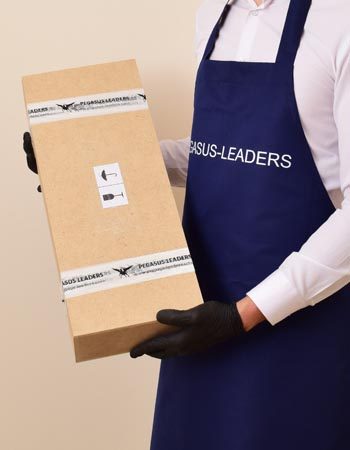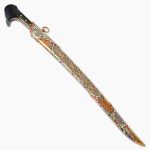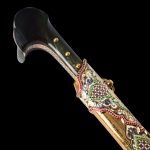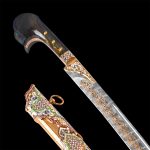Basically, the yatagan is known as a specific weapon of the Turkish Janissaries. According to legend, the Sultan forbade the Janissaries to wear sabers in peacetime. Janissaries circumvented this ban by ordering arm-length combat knives. And so the Turkish yatagan appeared. Some yatagans have a biconcave blade (like the Egyptian khopesh) – reverse at the base of the blade and saber at the tip. The yatagan usually has a bone or metal handle. The scabbard of the yatagan is wooden, covered with leather or lined with metal. Since there is no guard, the yatagan blade enters the sheath with part of the hilt. The total length of the yatagan is up to 80 cm, the length of the blade is about 65 cm, the weight without scabbard is up to 800 g, with scabbard is up to 1200 g. In addition to Turkey, the yatagan was used in the armies of the countries of the Middle East, the Balkan Peninsula, South Transcaucasia and the Crimean Khanate.
Yatagan Sword
6 540 USD
An extended version of the yatagan. Decorated with dozens of stones and hand-engraved metal. A sturdy blade of Damascus steel.
Order production
Description
Additional information
| Material |
Cubic Zirconia, Damascus steel, Enamel, Gold 24KGP (gold plating), Nickel plating, Silver plating 22K, Wood |
|---|---|
| Package |
Wooden box with fabric lodgement |
Shipping & Delivery


FREE SHIPPING
Pegasus Leaders offers free DHL express shipping worldwide.
Delivery of the order is made by courier to the door
SAFETY
- Each order is securely packaged. Air-bubble film, corners, cardboard, wooden are used.
- We insure our products against damage and accident during transportation. Check the safety of the products at the time of receipt.
- After processing the order and receiving all export permits, we will send you a tracking number for your order.
Depending on the country and the amount of the order, you may be required to pay customs duties in accordance with the customs laws of the country of destination. Each country decides for itself what customs fees and on what goods it establishes. According to the international rules of trade Incoterms 2020 CIF, the seller cannot pay customs duties and fees of the buyer's country. The buyer pays for them.























